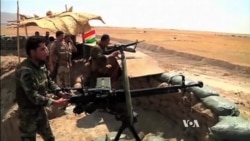Western countries including the United States have begun arming the Kurdish Peshmerga forces in northern Iraq to aid their battle against extremist Sunni militants from the Islamic State group. But there are concerns a heavily-armed Kurdistan Regional Government might seek to declare independence and cause the break-up of the Iraqi state. The Kurdistan Regional Government says it will only seek greater autonomy from Baghdad.
On the outskirts of Irbil, the capital of Iraqi Kurdistan, traders display AK-47 assault rifles alongside other aging weapons and ammunition. Business is booming; after a decade of relative peace, the Kurds in northern Iraq believe their existence is threatened by the Islamic State militant group.
Lukman Qader is among the hundreds of customers browsing the market.
“Just like other people I have come here to buy a weapon to defend my family and my homeland,” he said. “But all the arms here are old and the ammunition is out of date.”
Western arms
The Kurds’ Soviet-era arsenal is being updated, as several Western countries, including the United States and France, have begun arming the Kurdish Peshmerga forces.
The Kurds have long dreamed of an independent homeland, and the arrival of advanced Western arms could have unintended consequences, says Afzal Ashraf of the Royal United Services Institute in London.
“The Kurdish homeland straddles what is Iraq, what is bits of Iran, and Syria, and Turkey. And if there are nationalists in the Kurdish Regional Government who want to pursue that agenda with those additional arms and with the additional experience, they could pose a threat to stability in that region,” he said.
This week Kurdish forces, backed by the Iraqi army and aided by U.S. airstrikes, seized control of the strategic Mosul Dam from Sunni militants. The battle against the Islamic State, or ISIS, militants, is uniting rival Kurdish factions, says Zeynep Kaya of the Middle East Center at the London School of Economics.
“ISIS is bringing the Kurds in Syria and the Kurds in Iraq together, even though the [rival Kurdish factions] KDP and PYD were not on good terms until recently," she said. "Now, the PYD and PKK forces also are helping Peshmerga.”
PKK militants fought a decades-long war for autonomy against the Turkish state. Peace talks are ongoing. The Kurdistan Regional Government in Iraq would be reluctant to upset Ankara by stirring Kurdish nationalism, says Kaya.
Oil wealth
“KRG’s oil exports depend on Turkey," she said. "So the more the Kurdistan Regional Government is increasing its power in the region and within Iraq, the more it is becoming sort of dependent on Turkey.”
The oil wealth has caused friction with Iraq's central government. Economic independence from Baghdad is a key demand of the Kurds, says representative of the Kurdistan Regional Government in London, Bayan Sami Abdul Rahman.
“They [Baghdad] have tried to centralize control of the oil and gas sector, we have of course gone against that. Where Baghdad has failed to control us, they have punished us," she said. "Since January we have not had our budget. It is a ridiculous situation that today, Kurdistan is facing the most well-armed and rich terrorist organization in the world, and yet we have not had our budget from Baghdad.”
If Iraq is to survive as a state, there will have to be big changes, says Abdul Rahman.
“Even after [the Islamists] are pushed out, defeated, and we go back to, let us say business as usual, it will not be business as usual. The fact is that Iraq has to be regionalized if it is going to stay together,” she said.
The future of Kurdistan will have to wait. The Kurds, the Iraqi army and the West are united in battle against the Islamic State militants.





